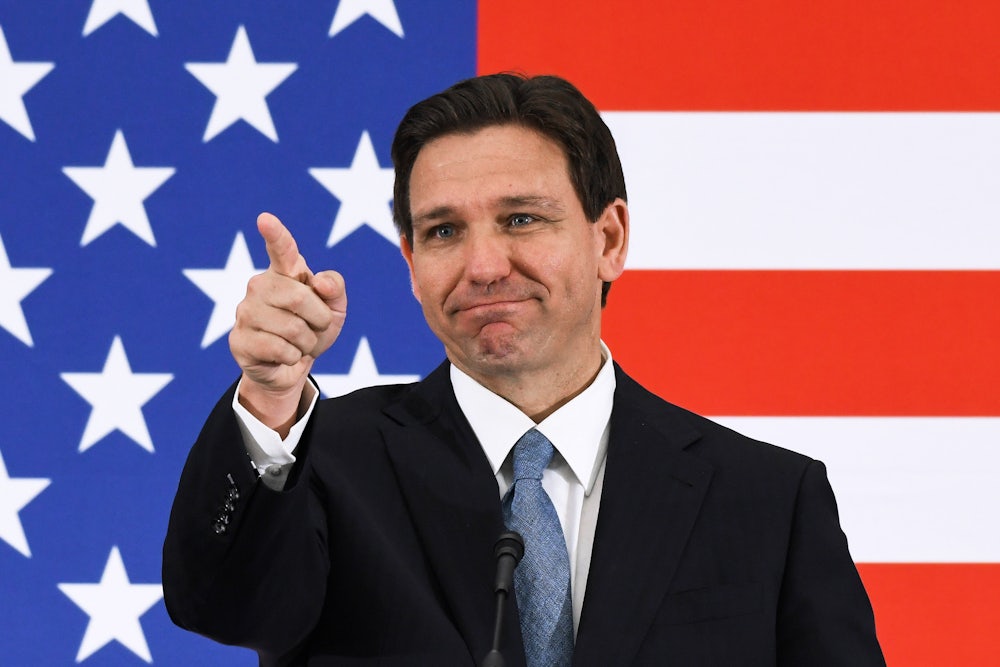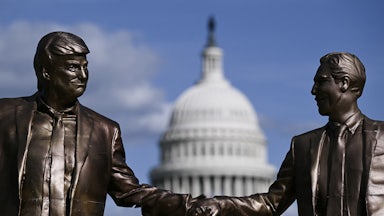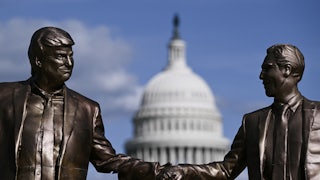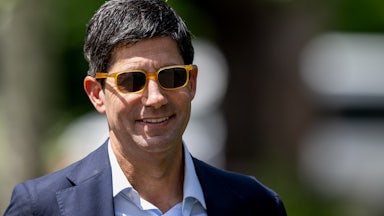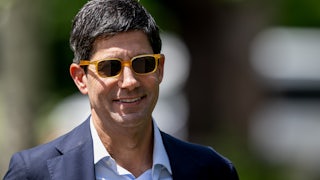Where did it all go wrong for Ron DeSantis? You could point to Donald Trump’s first indictment—or his second, for that matter—when Republican voters rallied behind the former president in droves. You could point to the Florida governor’s disastrous, glitchy campaign launch on Elon Musk’s disastrous, glitchy Twitter. You could point to DeSantis’s early struggles to gain momentum in the primary, which led to a dramatic expansion of the Republican field. In time, you might point to this week, when it became clear that the GOP donor class and, most importantly, Fox News honcho Rupert Murdoch, had soured on their onetime favored son and were beginning to look elsewhere, specifically toward Tim Scott, a sunnier alternative (who is, nonetheless, doing significantly worse than DeSantis).
But Ron DeSantis’s biggest problem is existential: It’s that he’s Ron DeSantis. Polling has consistently shown that the more voters get to know him, the less they like him. His numbers have been trending steadily downward since speculation about his campaign began to ramp up in earnest. At the start of the year, shortly after he had romped to reelection in Florida, DeSantis and Trump were neck and neck. Ever since, his numbers have steadily declined. A late-June NBC poll found that DeSantis had dropped nine points since April—and was now at only 22 percent, a staggering 29 points behind Trump. FiveThirtyEight’s aggregate poll currently has him sitting at 21 percent—28 points behind the former president.
DeSantis’s DeSantis problem doesn’t end there, however. Voters—and the national media—have noticed that he’s, well, a bit weird. Stories about DeSantis’s lack of charisma and general off-puttingness abound, reinforcing the idea that he’s cold and awkward. He has entered what can only be called the Ted Cruz zone: a self-perpetuating narrative in which tales of a candidate’s aloofness (to put it mildly) are constantly being pushed to the fore. For most of the last three years, Ron DeSantis’s story was about him being the future of the Republican Party. Now, he already looks like a loser.
To be fair to DeSantis, things aren’t quite as dire as they were for Cruz back in 2016. As Cruz unsuccessfully pushed to make himself a viable alternative to Donald Trump, he faced a steady barrage of stories that focused on the fact that no one seemed to like him. His colleagues in the Senate—on both sides of the aisle—detested him. His college roommate—TV writer Craig Mazin—tweeted about him masturbating and called him “a huge asshole.” His wife revealed that he purchased 100 cans of Campbell’s Chunky Soup after their honeymoon. He was a theater kid who did cringey reenactments of The Princess Bride. He got a gross thing stuck on his lip during a Republican presidential debate and then ate it. As he tried unsuccessfully to convince voters that he was a viable candidate, Cruz had an albatross around his neck: Ted Cruz.
DeSantis finds himself in a similar position. Ever since he fell on his face during his Twitter Spaces launch with Musk—an event that was hampered by several crashes and glitches before it eventually began with a diminished audience—the story about DeSantis is that he’s a weirdo and a loser. He has not helped things by consistently bolstering that narrative. He has been hurt by a number of Cruz-ish stories: He once ate pudding with his fingers. Hardly a natural retail politician, he treats colleagues, staffers, and voters with the same sense of coldness, forgetting (or failing to ever learn) names. “He doesn’t like talking to people, and it’s showing,” one longtime supporter told The Washington Post. Above all, he’s just a little bit off, almost inhuman: Look no further than this video of him laughing.
oh my god why did no one tell me this is what the video looks like pic.twitter.com/pPcff2UeB7
— Tim Hogan (@timjhogan) May 16, 2023
The good thing for DeSantis is that it’s very early in the race and there’s plenty of time to reset himself. The first Republican debate, next month, will give him a crucial opportunity to fix his flagging campaign (or another opportunity to crash it and burn). His campaign has worked to reassure donors—in part by telling them that he won’t attack Donald Trump—and is working on an early reset. His “in-house marketing team ... has created and algorithmically message-tested 14,000 ads and related variations” that will be unveiled shortly, according to The Messenger’s Marc Caputo; his ground game is ready to blitz in early voting states. DeSantis still has a ton of money he can use to try to push himself back into the center of the race.
But that’s also a problem: Resetting a narrative that you’re a loser requires a win and it’s not quite clear how DeSantis can get that, especially since voters won’t go to the polls for another six months. And given the media expectations game, anything short of a dominating debate performance is likely to be contextualized away as another missed opportunity. But has DeSantis shown anything to this point to suggest such a bacon-saving performance is in the offing?
More than anything, though, his failings only underscore just how much he’s squandered. Not so long ago, DeSantis had everything going for him. Ever since he rose to national prominence by defying public health warnings during the pandemic, the Florida governor was touted as both the future of the Republican Party and Donald Trump’s natural successor. He was supposed to be the Goldilocks candidate, one just radical enough for the barbarians and just posh enough for the guys who sign the checks. No one else so naturally fit the bill for a party that realized that the alternative to Donald Trump had to be just a little bit Trumpy. So, correcting mistakes made in 2016, the GOP’s donor class successfully cleared the field for him, giving him a (more or less) open runway and a chance at a (more or less) head-to-head race. Fox News’s Rupert Murdoch had his back. So did Rupert Murdoch’s Fox News.
It was easy to see why—at least from a distance. He was feisty and sharp-elbowed, willing to take on the political establishment. But he also was calculating and disciplined. In DeSantis, the thinking went, everyone got what they wanted, more or less. Trump supporters got a culture warrior willing to own the libs at every opportunity. Trump skeptics got someone far less likely to shoot himself in the foot with no warning—or, for that matter, to plunge the country into chaos with a tweet. He was popular in Florida. He checked the boxes that Republican voters and Republican donors seemingly wanted checked.
But in hindsight that was all the idea of Ron DeSantis. The real one is short and cold and more than a little weird. To know him, it seems, is to detest him. As the GOP primary heats up, his campaign continues to sink. He only has himself to blame.
